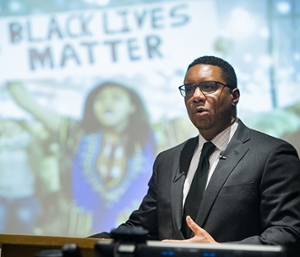 Many people look at the 1960s with a sense of nostalgia and even folklore, according to Southern Illinois University Edwardsville alumnus Clarence Lang, PhD. However, while the era saw many Civil Rights struggles and victories, the period does not provide a useful frame of analysis for understanding how to make progressive social change today.
Many people look at the 1960s with a sense of nostalgia and even folklore, according to Southern Illinois University Edwardsville alumnus Clarence Lang, PhD. However, while the era saw many Civil Rights struggles and victories, the period does not provide a useful frame of analysis for understanding how to make progressive social change today.
Lang, a professor of African and African American Studies at The University of Kansas, presented “Black History Studies from Obama to Trump: Reflections and Shadow of the 60s” on Feb. 15 in Lovejoy Library's Abbott Auditorium. SIUE’s Department of Historical Studies and the Black Studies Office sponsored Lang’s visit.
Lang earned his master’s in history from SIUE in 1997. He was a lecturer in the Department of Historical Studies from 2000-01. His presentation was an outgrowth of one of his books, Black America in the Shadow of the 60s: Notes on the Civil Rights Movement, Neoliberalism and Politics.
The professor highlighted and illuminated several aspects about the 1960s Civil Rights Movement not widely viewed or considered.
“When we look at the grassroots of the 1960s leadership, they were not solely men, and the communities were not solely southern,” explained Lang. “We cannot overlook the struggles that occurred in Los Angeles, Oakland, New York City, Philadelphia, Chicago, Detroit, St. Louis and East St. Louis.”
“And Civil Rights was not just about individual market-based liberties over group-based social democratic rights,” he added. “It was not just lunch counter sit-ins and bus boycotts, but was also about better employment and economic opportunities, being able to meaningful choose political representation and the ability to shape urban planning and development policy.”
Many activists and scholars misread the 1960s, according to Lang. “We use the ‘60s in an uncritical way to approach the prospect for social movements today. This undermines our ability to interpret and respond to the unique social and political challenges of our contemporary moment.”
What protests have developed today, such as the Black Lives Matter movement, should not be wedged into the same criteria – real or imagined – of the 1960s, Lang further explained.
The 1950s also have nostalgia and myth related to it. “The ‘Make America Great Again’ slogan hearkens back to and is predicated on the ‘50s, where suburban life is emphasized. Only a small segment of white Americans lived in the suburbs.”
“If you looked at the 1950s as a house, you would have black people in the backyard tending to work, women in the kitchen and gay people in the closet,” said Lang. “It is harmful to have this kind of unthinking nostalgia when you approach history.”
“America has always been multiracial, but we’ve imagined it otherwise,” he continued. “That’s very dangerous. It not only subordinates people of color, but the nostalgia of the ‘50s also has a prescribed role for women and for those who fall outside of gender norms.”
In looking at the presidency of Barack Obama, history may paint it as a moment in time, Lang surmised. “Many people confused the Obama presidency as a social movement, and it was not,” he emphasized. “Some people thought that racial justice work was done when Obama was elected, and it was not.”
“Black studies, at its best, can be a vehicle for engaging a present informed by, but not stuck, in black people’s imaginative historical past,” said Lang. “I’m hopeful that new paradigms and thought will proceed from the conditions of black life as they actually exist rather than an inaccurate imaginative about African Americans pursuit of racial justice.”
“I try to remain optimistic about the future,” he added, “because I am hopeful about the capacity of ordinary people to make change.”
Photo:
SIUE alumnus Clarence Lang, PhD, professor of African and African American Studies at The University of Kansas.